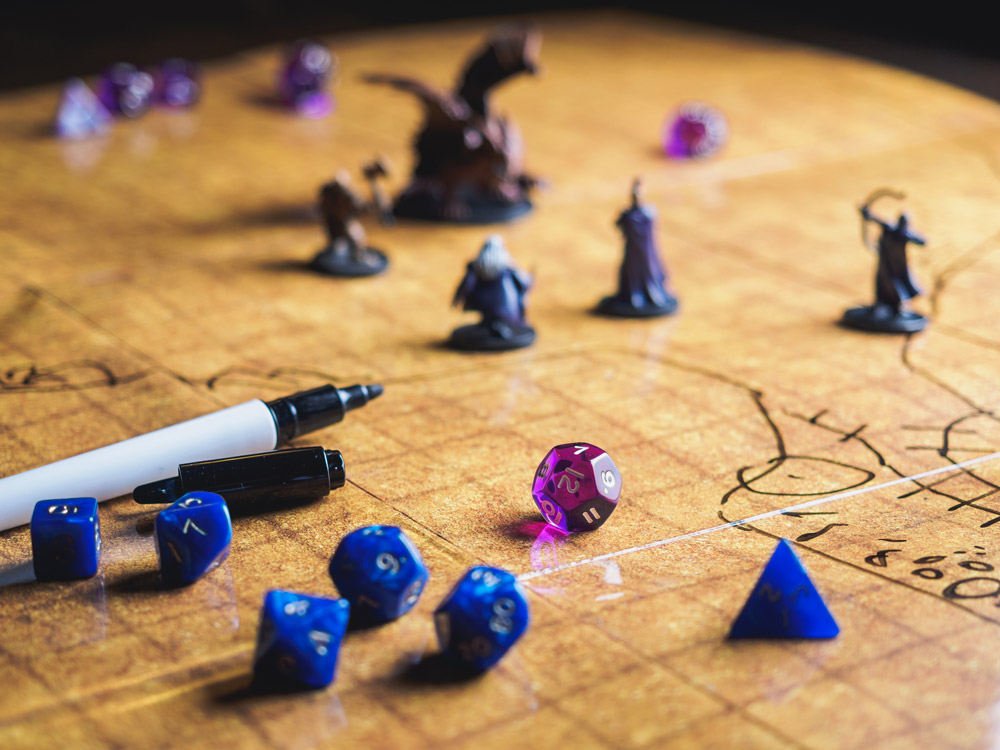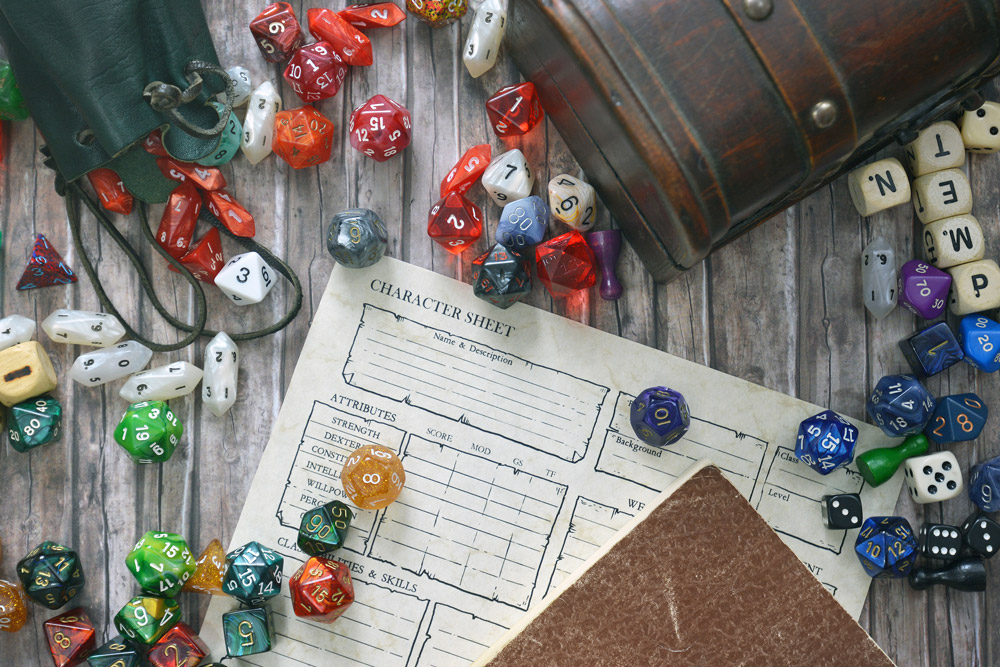Why Tabletop Role Playing Games?
When we treat children’s play as seriously as it deserves, we are helping them feel the joy that’s to be found in the creative spirit. It’s the things we play with and the people who help us play that make a great difference in our lives. ~ Fred Rogers
Therapy interventions can take on many forms including art, dance, music, talk, massage, group, pharmacological, and play. The goal in any type of therapy is usually the same. To restore or create function where once there was dysfunction.

A person may have difficulty leaving their home without fearing for their personal safety. Trauma may have deeply affected their ability to trust others or find pleasure in social interactions. Depression might alter a person’s image of themselves so dramatically that they can only find relief from their psychological pain by harming themselves. Still, others may struggle to find acceptance among their peers or loved ones so much so that they isolate themselves by playing hours of video games to escape from the reality that is too difficult to face.
One thing that most mental health disorders have in common is that they hijack a person’s ability to experience joy in playing with others. While the introductory quote may refer to children, play is just as important to adults. Through play, we can safely explore challenges, challenge our perspectives, and discover creative solutions. Is it any wonder that when a team of negotiators prepares for any major negotiation they role-play the talks many times before the actual event? Good negotiators will not only play their own part, but will play the part of their counter-negotiator until they have a clear understanding of the other person, their interests, and potential barriers to solutions. This kind of play proceeds billion-dollar business deals, critical peace talks, life-or-death hostage negotiations, and even large-scale military actions.
Play, more specifically, role-play, helps us define our relationships with ourselves and others. It requires imagination, impulse control, frustration tolerance, cognitive flexibility, and more.
We have been using tabletop role-playing games in group therapy for over 5 years now and believe it is one of the best ways to help people engage with others and rewrite their personal narrative from that of dysfunction to that of function.
What is Tabletop Role-Playing Game Therapy (TRPG)?
TRPG Therapy is group therapy that utilizes narrative and role-play therapies combined into a game where participants work as a team to solve problems, improve interpersonal effectiveness, increase distress tolerance, and increase critical thinking skills through the use of storytelling and gameplay.
What happens during a session?
During TRPG Therapy, group members meet together for 90 minutes and interact with the therapist who acts as the main storyteller. Group members must make decisions based on the story and choose how their character will interact with other group members’ characters, and characters from the story referred to as non-player characters or NPCs. The therapist will create challenges for participants which focus on developing social skills, increasing distress tolerance, increasing communication skills, increasing, problem-solving skills, and more.
What are some of the benefits of TRPGs?
Social-emotional Learning
Many games emphasize competition between players. Players are pitted against one another seeking advantage against their opponent, and ultimately one rises triumphant from the group.
However, TRPGs are fundamentally different. They focus on cooperative play. The group rises or falls together, and as each player has a specific role to play within the group no one person will take the spotlight every time. Each person will have their moment of triumph, but it’s a moment that is shared by all the members of the team. When players work together they develop social-emotional learning skills. During campaigns, players will collaboratively solve problems, negotiate differing opinions, take the perspective of their own character and of other players’ characters, and share in the genuine joy of success and bitterness of defeat.
Self-confidence, self-control, empathy, perspective-taking, social reciprocity, and self-awareness are all linked to academic success. Furthermore, the development of these skills generally leads to people living happier, better-quality lives. TRPGs require the player to use all of these skills and more as they work together to overcome adversity and weave their stories together.
Role-playing games feel real, but they aren’t real.
The feelings players get while playing TRPGs are genuine and strong. When their character comes near death they feel a genuine jolt of emotion. Players who develop a love for their character step into risky situations very much like they would in real life. They will not quickly risk losing their beloved character, however since they also understand it is a game they are playing they will push the boundaries of their actions outside of their normal comfort zone and thus begin to experience the reward of taking chances and succeeding over adversity.
Players rejoice when they are successful, and feel the bitterness of defeat at times. They experience, guilt, remorse, apprehension, fear, anger, regret, embarrassment, and so much more throughout a single campaign. And yet, most of the time these emotions, though genuine, do not overwhelm them the same way they might in real life. In the world of a TRPG players are able to experience these emotions authentically in the moment, but when the session ends they can leave those emotions and return to real life with a smile on their faces.
We have witnessed players grieve over the loss of a beloved allied non-player character (NPC), and as the session ended leave with smiles on their faces recounting the adventures they had with this fictitious person.
TRPGs Teach Problem solving
A major aspect of any TRPG is the problems that players meet and solve over the course of any adventure. Problems may take on the form of puzzles, traps, political schemes, stubborn NPCs, or even an enemy which seems indestructible. No matter what the problem may be players have to be creative and persistent in overcoming challenges.
What Game do you use?
We use our very own Game called Legends of Lorem. We have spent thousands of hours developing this game with group therapy in mind.

When we first started using TRPGs in therapy, 2 years prior to the creation of Legends of Lorem, we used one of the most popular TRPGs on the market. This was done–admittedly–only because we didn’t really know there were other TRPGs available.
Why Make a New TRPG?
Popular TRPG titles are not, nor will they ever be, marketed as therapy games. These games were designed with one goal in mind; entertainment. While the worlds created are expansive and immensely fun to explore they are not designed with therapy in mind. Any benefit from playing said games is a side effect rather than a focus of the game.
For this reason, Legends of Lorem was created with group therapy practices and theories at the very center of the creation. As we created the rules and structure of the game we scrutinized each addition to the game to gauge its therapeutic value. Even the character sheet is designed to help focus players’ attention on personal growth and development and not just the growth and development of their character. The game allows for frequent pausing for discussion and reflection.
The legends played in Lorem are chosen and designed by skilled guides with specific therapeutic goals in mind–though it is hoped that the story is also entertaining.
References for Research
- Matthew Varrette, Jack Berkenstock, Adams Greenwood-Ericksen, Anthony Ortega, Faith Michaels, Veronica Pietrobon & Marc Schodorf (2022) Exploring the efficacy of cognitive behavioral therapy and role-playing games as an intervention for adults with social anxiety, Social Work with Groups, DOI: 10.1080/01609513.2022.2146029
- Hammer, Jessica & To, Alexandra & Schrier, Karen & Bowman, Sarah & Kaufman, Geoff. (2018). Learning and Role-Playing Games. 10.4324/9781315637532-15.
- Bowman, S.L. (2010). The functions of role-playing games: How participants create community, solve problems, and explore identity. Jefferson, NC: McFarland.
- McGonigal, J. (2011). Reality is broken: Why games make us better and how they can change the world. New York: Penguin.
- Crenshaw, D. (Ed.)., Stewart, A. , & Gardner, B. (2015). Play therapy with adolescents. Play Therapy: A Comprehensive Guide to Theory and Practice, 439-451.
- Rubin, L. (Ed.)., & Enfield, G. (2007). Becoming the hero: The use of role-playing games in psychotherapy. Using Superheroes in Counseling and Play Therapy, 227-241.
- Abbott, M.S., Stauss, K.A., & Burnett, F. A., (2022) Table-top role-playing games as a therapeutic intervention with adults to increase social connectedness, Social Work with Groups, 45:1, 16-31, DOI: 10.1080/01609513.2021.1932014
